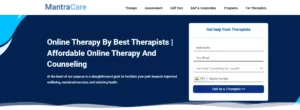Postpartum issues, encompassing a range of emotional and mental health challenges that some mothers face after childbirth, are a critical aspect of postnatal care. Understanding and addressing these concerns are paramount for the overall well-being of both mother and child. In this article, we will explore the role of a psychiatrist in supporting individuals dealing with postpartum issues.
Contents
- 1 Factors Contributing to Postpartum Issues
- 2 Symptoms To Watch Out
- 3 The Role Of A Psychiatrist in Postpartum Care
- 4 Therapeutic Approaches Used by a Psychiatrist
- 4.1 Cognitive-Behavioral Therapy (CBT)
- 4.2 Interpersonal Therapy (IPT)
- 4.3 Psychodynamic Therapy
- 4.4 Mindfulness-Based Therapy
- 4.5 Dialectical Behavior Therapy (DBT)
- 4.6 Medication Management
- 4.7 Supportive Psychotherapy
- 4.8 Group Therapy
- 4.9 Family Therapy
- 4.10 Expressive Therapies (Art, Music, or Movement)
- 4.11 Eye Movement Desensitization and Reprocessing (EMDR)
- 5 Here Are Some Self-Help Strategies That Might Help
- 6 Resources for Support Near You That Might Help
- 7 Conclusion
Factors Contributing to Postpartum Issues
 The postpartum period, often considered a time of joy and celebration, can also bring about challenges that affect a new mother’s mental health. Understanding the factors that contribute to postpartum issues is crucial for early recognition and intervention. Here are some key elements to consider:
The postpartum period, often considered a time of joy and celebration, can also bring about challenges that affect a new mother’s mental health. Understanding the factors that contribute to postpartum issues is crucial for early recognition and intervention. Here are some key elements to consider:
- Hormonal Changes
The dramatic hormonal shifts that occur after childbirth, including a significant drop in estrogen and progesterone, can impact mood regulation. These hormonal fluctuations may contribute to the onset of postpartum issues.
- Lack of Sleep
New mothers often face sleep deprivation due to the demands of caring for a newborn. Sleep plays a vital role in mental health, and disruptions in sleep patterns can exacerbate feelings of stress, anxiety, and mood swings.
- Physical Recovery
The process of recovering from childbirth can be physically demanding and challenging. The body undergoes significant changes, and the postpartum period requires a considerable amount of energy and adjustment.
- Pre-existing Mental Health Conditions
Women with pre-existing mental health conditions, such as depression or anxiety, may be more susceptible to experiencing exacerbated symptoms during the postpartum period. It’s essential to address these conditions proactively.
- Lack of Social Support
Isolation and a lack of support from friends, family, or a partner can contribute to feelings of loneliness and overwhelm. Building a strong support network is crucial for emotional well-being during the postpartum period.
- Unmet Expectations
Expectations about motherhood and the postpartum period can vary widely. Unrealistic expectations or unmet desires can lead to feelings of disappointment, inadequacy, and stress.
- Relationship Changes
The dynamics of relationships, especially with a partner, may shift after the arrival of a child. Adjusting to these changes can be challenging and may contribute to emotional distress.
Symptoms To Watch Out
Recognizing the symptoms of postpartum issues is the first step toward seeking help and support. While every individual may experience postpartum challenges differently, here are some common symptoms to be mindful of:
- Intense Mood Swings
- Persistent Sadness or Anxiety
- Changes in Appetite or Sleep Patterns
- Difficulty Bonding with the Baby
- Intrusive Thoughts
- Fatigue and Lack of Energy
- Loss of Interest or Pleasure
- Difficulty Concentrating
- Changes in Self-esteem
- Thoughts of Self-harm
- Social Withdrawal
- Excessive Worrying
- Physical Aches and Pains
- Difficulty Sleeping, Despite Fatigue
- Recurrent Panic Attacks
By understanding these factors and symptoms, individuals, their families, and healthcare professionals can work together to address postpartum issues promptly and effectively. Seeking professional support is a vital step toward promoting mental well-being during this transformative period.
The Role Of A Psychiatrist in Postpartum Care

The postpartum period is a transformative time that can bring about various emotional and mental health challenges for new mothers. Psychiatrists play a pivotal role in providing specialized care to address and alleviate these challenges. Here are key aspects of the role of a psychiatrist in postpartum care:
- Specialized Assessment:
- Conducting a thorough evaluation of the individual’s mental health, considering both pre-existing conditions and postpartum-specific factors.
- Identifying symptoms and potential risk factors to tailor a personalized treatment plan.
- Diagnosis and Treatment Planning:
- Utilizing specialized knowledge to diagnose postpartum mental health conditions, such as postpartum depression, anxiety, or psychosis.
- Collaborating with the individual to develop a comprehensive and individualized treatment plan.
- Counseling and Psychotherapy:
- Providing a safe and supportive space for the individual to express their thoughts and emotions.
- Using therapeutic techniques such as cognitive-behavioral therapy (CBT), psychodynamic therapy, and interpersonal therapy to address underlying issues.
- Education and Guidance:
- Offering psychoeducation to empower individuals with information about postpartum mental health.
- Providing guidance on self-care practices, coping strategies, and available resources.
- Ongoing Monitoring and Follow-Up:
- Monitoring the individual’s progress throughout the treatment plan.
- Conducting regular follow-up appointments to make adjustments as needed, ensuring continuous support.
- Crisis Intervention:
- Being prepared to address crises and provide immediate intervention when necessary.
- Collaborating with emergency services to ensure the safety of the individual.
- Tailored Therapeutic Approaches:
- Utilizing a variety of therapeutic approaches, including cognitive-behavioral therapy, psychodynamic therapy, and mindfulness-based techniques.
- Customizing treatment strategies based on the unique needs and preferences of the individual.
In essence, the role of a psychiatrist in postpartum care goes beyond diagnosis and treatment. It involves providing compassionate and comprehensive care that addresses the complexities of this unique period in a woman’s life.
Therapeutic Approaches Used by a Psychiatrist

When addressing postpartum issues, a psychiatrist employ a range of therapeutic approaches to provide comprehensive and tailored care. These techniques aim to address the emotional, psychological, and social aspects of an individual’s well-being. Here are key therapeutic approaches used by psychiatrists:
Cognitive-Behavioral Therapy (CBT)
- Focuses on identifying and challenging negative thought patterns.
- Helps individuals develop healthier coping mechanisms and behaviors.
- Effective in addressing anxiety, depression, and stress.
Interpersonal Therapy (IPT)
- Targets interpersonal issues and conflicts.
- Aims to improve communication and relationship dynamics.
- Particularly useful for individuals facing challenges in relationships postpartum.
Psychodynamic Therapy
- Explores unconscious thoughts and emotions.
- Emphasizes the influence of early experiences on current behaviors.
- Provides insights into underlying issues contributing to postpartum challenges.
Mindfulness-Based Therapy
- Incorporates mindfulness and meditation techniques.
- Helps individuals stay present and manage overwhelming emotions.
- Effective in reducing stress and promoting overall well-being.
Dialectical Behavior Therapy (DBT)
- Focuses on building skills in emotion regulation and interpersonal effectiveness.
- Combines cognitive-behavioral techniques with mindfulness.
- Particularly beneficial for individuals dealing with intense emotional experiences.
Medication Management
- Psychiatrists may prescribe medications to alleviate symptoms.
- Antidepressants and anti-anxiety medications are common in postpartum care.
- Medication management is carefully tailored to the individual’s needs and circumstances.
Supportive Psychotherapy
- Provides emotional support and guidance.
- Encourages individuals to express their feelings in a safe environment.
- Enhances coping skills and fosters a sense of empowerment.
Group Therapy
- Involves participation in a therapeutic group setting.
- Allows individuals to share experiences and receive support from peers.
- Group dynamics contribute to a sense of belonging and understanding.
Family Therapy
- Addresses familial dynamics and relationships.
- Involves family members in the therapeutic process.
- Aims to strengthen support networks and improve communication.
Expressive Therapies (Art, Music, or Movement)
- Utilizes creative expressions to explore emotions.
- Can provide an alternative way to communicate feelings.
- Offers a non-verbal outlet for individuals who may find traditional talk therapy challenging.
Eye Movement Desensitization and Reprocessing (EMDR)
- Effective for individuals with trauma-related symptoms.
- Involves guided eye movements to process distressing memories.
- Helps reprocess traumatic experiences and reduce associated symptoms.
These therapeutic approaches are not mutually exclusive, and psychiatrists often tailor their strategies to meet the unique needs of each individual. The goal is to provide a holistic and effective treatment plan that supports the individual’s postpartum mental health journey.
Here Are Some Self-Help Strategies That Might Help
 Navigating postpartum challenges can be an intricate journey, and while professional support is crucial, there are also self-help strategies that individuals can incorporate into their daily lives. So, here are some practical tips for handling postpartum situations:
Navigating postpartum challenges can be an intricate journey, and while professional support is crucial, there are also self-help strategies that individuals can incorporate into their daily lives. So, here are some practical tips for handling postpartum situations:
- Mindfulness and Meditation:
- Engage in mindfulness practices to stay present in the moment.
- Practice meditation to calm the mind and reduce stress.
- Incorporate deep-breathing exercises into daily routines for relaxation.
- Physical Activity:
- Integrate regular physical activity into your routine, even if it’s a short walk.
- Consider postpartum-friendly exercises that promote both physical and mental well-being.
- Exercise releases endorphins, which can positively impact mood.
- Establish a Routine:
- Create a daily routine that includes dedicated self-care time.
- Prioritize adequate sleep and establish a sleep routine to improve overall well-being.
- Structure can bring a sense of predictability to chaotic postpartum days.
- Express Yourself Creatively:
- Engage in creative outlets, such as journaling, drawing, or crafting.
- Expressing emotions through creative means can be therapeutic.
- Create a postpartum journal to track your thoughts and progress.
- Prioritize Self-Care:
- Allocate time for self-care activities, whether it’s a warm bath, reading, or enjoying a hobby.
- Communicate your self-care needs with your support network.
- Recognize that taking care of yourself is essential for effective caregiving.
- Nutrition and Hydration:
- Maintain a balanced and nutritious diet to support overall well-being.
- Stay hydrated, as dehydration can impact both physical and mental health.
- Consider consulting with a nutritionist for personalized guidance.
- Learn and Apply Stress Management Techniques:
- Learn stress management techniques such as progressive muscle relaxation.
- Practice time management to reduce feelings of being overwhelmed.
- Identify stressors and work on strategies to mitigate their impact.
Incorporating these self-help strategies into daily life can contribute to a more resilient and empowered postpartum experience.
Resources for Support Near You That Might Help
 In the digital age, accessing support for postpartum issues has become more accessible than ever. TherapyMantra at MantraCare offers a range of online services designed to provide comprehensive mental health support for individuals navigating the challenges of the postpartum period. Here are some of the online services offered:
In the digital age, accessing support for postpartum issues has become more accessible than ever. TherapyMantra at MantraCare offers a range of online services designed to provide comprehensive mental health support for individuals navigating the challenges of the postpartum period. Here are some of the online services offered:
- Online Support Groups:
- Join virtual support groups facilitated by skilled moderators.
- Connect with individuals facing similar postpartum challenges and share experiences in a supportive online environment.
- Telepsychiatry Services:
- Benefit from remote psychiatric consultations via telepsychiatry.
- Receive expert guidance on medication management and tailored treatment plans.
- 24/7 Helpline:
- Access a 24/7 helpline for immediate support and crisis intervention.
- Speak to trained professionals who understand the complexities of postpartum mental health.
- Secure and Confidential Platform:
- Benefit from a secure and confidential online platform ensuring privacy in your mental health journey.
- Engage in virtual sessions with the assurance that your information is handled with the utmost care.
- User-Friendly Mobile App:
- Download a user-friendly mobile app for convenient access to services.
- Receive timely reminders for appointments and access self-help tools on the go.
- Flexible Scheduling:
- Enjoy the flexibility of scheduling appointments that suit your availability.
- Overcome logistical challenges by connecting with mental health professionals at a time that works for you.
At TherapyMantra at MantraCare, we understand the evolving landscape of mental health support and is committed to providing accessible and effective online services for individuals navigating postpartum challenges. Whether seeking virtual counseling, joining online support communities, or accessing educational resources, our online services are designed to empower individuals on their postpartum mental health journey.
Conclusion
In the intricate tapestry of postpartum challenges, the role of a psychiatrist emerges as a guiding light, offering specialized care and support to new mothers navigating the complexities of their mental health. From specialized assessments and tailored treatment plans to holistic care and destigmatization efforts, psychiatrists play a pivotal role in promoting well-being during this transformative period.
If you find yourself seeking answers or support, remember that a psychiatrist is a medical doctor specializing in mental health, and their expertise can make a significant difference. For any queries or to take the first step toward mental health support, the experienced therapists at TherapyMantra are ready to assist. Book a trial online therapy session today and embark on a journey of healing and empowerment.
Get the support you deserve. Book a trial Online therapy session with TherapyMantra – because your mental well-being matters.


